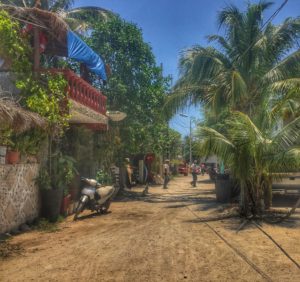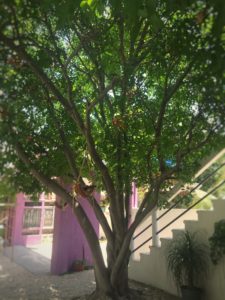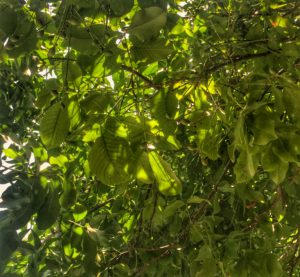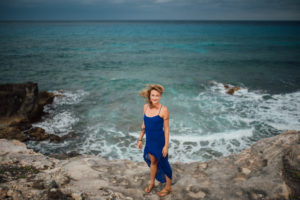I’m learning to feel like an island girl.
32 years an Upper Michigan woods-walker, stream-jumper, cold-water swimmer.
Now, I ride to drop off laundry at the lavandaria, laundry in my backpack.
The bike’s left brake, typical Isla-style, doesn’t work. I’ve learned to approach speed bumps–topes–with a mixture of caution and daring-do. Pulling up on the handlebars just in time, jerking the bike up and over.

My hair’s tangled, growing more blonde by the day, textured as only salty wind can twist.
My apartment with my boyfriend has become home.
I enter the alley mouth across from the Yamaha store, which is my guide-point when giving directions. The short road is unpaved, bumpy, and dusty. My feet kick up little clouds in the south breeze.
I pass Carnitas, meaty aromas waft my way, along with the sound of pounding cleavers chopping pork to be served in tortas and tacos.
I pass the mechanics, piles of half-taken-apart cars, welding torches’ snap and hiss accenting the steamy afternoon.
I pass the barking poodle and sweet puppy Toby with his crippled back legs and slinky walk. He can’t walk well, but rolls about on his hips like a wobbly-dog doll as he plays with my puppy, Bea.
I walk through the archway and across the loose gravel that catches bike and moped tires, and into the door where my handsome man and two tail-waggers wait–eager for my return.
I’m creating another family in Mexico–far away from other families, in their various incarnations, I’ve left behind.
There’s a hesitancy in my home-making. A limbo between spaces that’s familiar, freeing, exciting, frightening, and uncomfortable.
Part of me craves the excitement of disconnectedness.
Part of me craves the stability of a home space.
The buoyancy of vacation-life on the island has been supplanted by the realities of moving to a foreign country with a 100 year old rental house in Michigan: frozen pipes, exploded hot water heater, wasp invasion, bill pay, lost debit card, need for employment/work visa, and an overwhelming sense of the unknown in my future that’s both terrifying and exhilarating.
I walk the dogs down the alley, across the street, and into the baseball field for their morning constitution.
OG, the yellow lab, runs ahead, 120 lbs. straining against the leash. Bea’s 45 lbs. pulls on my other arm, making for an interesting balance of yank and pull.
I watch as they frolic across the baseball field’s dirt and grass expanse. Bea runs for a coconut, pouncing on it and running off with it clenched precariously in her front teeth.
A year ago I watched her pull sticks out of a Michigan river and run with them across the enormous lawn I push-mowed myself all summer.
Lessons, in what a year can bring.
On the island, American tourists pour off ferries and packed catamarans in all stages of drunken and sober; dressed and undressed; flip-flopped, sunburned, white and tan; sunglassed; saronged; thonged, jeaned, wet bottomed.
I feel territorial over this place I’ve only recently come to call home.
I welcome their business, happy to take dollars or pesos to keep my life here afloat, while also resenting their often obnoxious and disrespectful presence–similar to how I felt in the tourist town in Michigan I grew up and worked in as a teenager.
I went from a cabin in Deerton, Michigan–population 352, to the congested five mile long island, Isla Mujeres, population 12,700 give or take the couple thousand tourists that come and go on a daily basis.
Taxis, mopeds, motorbikes, and trucks roar and swerve down clamorous streets.
Hours could go by before a car or SUV would go down my Deerton road.
I stand in warm, turquoise surf at Playa Norte and spin a 360. White sand sifts around my feet as I turn– a circle, an orbit, a cycle like the sun that raises sweat along my hairline like morning dew on my Michigan yard’s wild strawberry plants.
Everywhere I look is an ever shifting undulation of humanity. Nowhere without a person or people.
Eyes, faces, mouths, stories, bodies exist and sigh and breathe.
I need somewhere quiet to rest and listen for the soft soft voice that is Rachel.
I tilt my head, a curious seabird, listening, as if to a shell.

Leeks are just beginning to break through last fall’s packed-down-brown leaves back in Michigan. Green tongues, licking spring air.
On Isla, the guaya tree outside my apartment inexplicably (as far as I was concerned) began dropping its leaves as though it were fall. Nancy, the fastidious landlady who’s apartment is across the courtyard, sweeps leaves off gravel industriously as a kitchen floor.
“Ryan? Is that tree dying?” I asked my boyfriend sleepily from our king size bed.
“No,” he laughed, simultaneously pulling me closer and patting OG’s large sleeping-polar-bear form. “It drops its leaves and then makes fruit.”
Ryan’s lived on the island five years and has a knowledge and understanding of Isla’s workings that I’m just beginning to understand.
“Oh,” I exclaimed with an edge of the same child-wonder as when I learned about the habits of beaver from my father, or the monarch butterfly life cycle from my mother.
This tree behaves much differently than the trees I’m used to–trees I observed through the Upper Peninsula of Michigan’s changing seasons for 32 years.
As days go by and Michigan tiptoes into spring, the guaya tree, which I first thought would quickly become nothing but a towering, leafless monolith stretches, what looked to me like late fall-bare-branches into a cloudless Caribbean blue sky.
Instead, almost as fast as its leaves dropped, little green leaflets began to grow in their place. Just like in Michigan.
“Tiny as a mouse’s ear.” As my mamma always says.
They grow rapidly, the tree never completely losing its green.
It’s like watching a tree go from summer/fall, directly to spring in a time-lapse parody.
Now, it’s growing little bunches that burst into tiny yellow flowers I know will soon become fruit.
After a little research, I learned that this is the same fruit I called a “kinnip,” when I traveled with friends and family to the Bahamas in middle school. My sister and our sister-friends ate the tart fruits until our lips puckered, fingers and faces sticky-sweet.
Now here’s this familiar/unfamiliar fruit in my front yard. Day by day, like the apples in my orchard back home, I watch the little fruits grow.
I asked people on Facebook and Instagram how they combat homesickness. The responses were varied–many humorous, some as simple as “cry it out,” but all kind and thought-provoking. The ones that stuck with me the most were those who advised me to immerse myself fully in the place I’m currently calling home.
This advice resonated with me because I’ve felt a bit ghostly of late–as though I’m lingering in limbo between two homes. Two worlds.
I crave the north world’s silence like a deep-seeded hunger, and look through social media pictures like a starving person sniffing restaurant aromas.
See Me. The Caribbean whispers as its north-wind-whipped-waves froth deep blue and aquamarine.
I’ve longed for this place for so long. Ached for it in February as I hauled and stacked wood. Awoke cold and shivering at 4 am to feed the wood stove. Shoveled snow only to watch as, like Sysiphus’ rock, it piled back in only a few hours. Higher. Deeper.
I lose track of the time of year without seasons to guide me. Caribbean blues reach out and pull me into salty water that licks behind my ears, making me hum happy. This kind of joy is hard-won and hard-earned with an icing of privilege that, in this place where so many live on so little, humbles me.
Sitting on the ferry, returning to the island from a day running errands in Cancun, the island shimmers on the horizon.
“Home,” I whisper under my breath. Tasting the word.
“What sweetie?” Ryan says, turning his sunglassed face to me so I see my reflection.
“Home,” I say again, the word like salt on skin, sand grit, tequila burn, beer buzz green bottle tang, saline seafood bites, and mango, orange-sweet as sunset.

Rachel: Nancy gave me your blog address. Amazing changes in your life. And of course, lovely writing. How does one follow your blog, other than just bookmarking it? Is there a sign-in? Best wishes.